The next day saw us wake
relatively early and head over to the well-known west coast migrant hotspot
that is Fort De Soto Park. Nestled right on the coast below St Petersburg, Fort
De Soto gets an incredible number of migrant birds stopping by to take advantage
of the rich food sources on offer and to take a break from their long journeys.
Having already seen the majority of birds to be expected at this time of year,
the skulking Swainson’s Warbler would be our best chance of a new lifer.
Parking up in the first car
park after entering the park, we were immediately met with a stonking red male
Summer Tanager in one of the large trees, but a quick mooch around the area
produced nothing else of note.
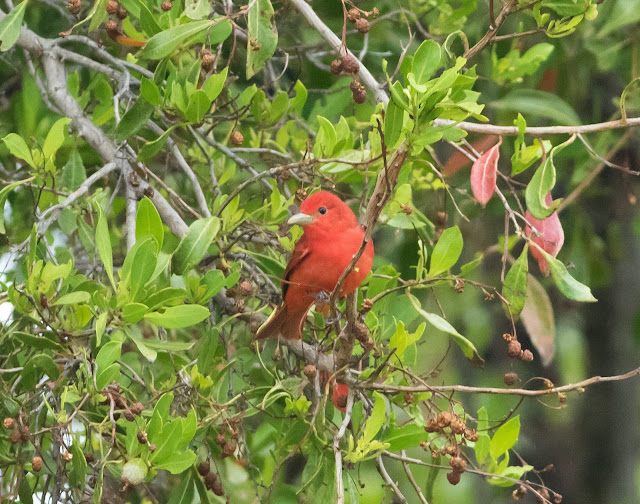 |
| Summer Tanager |
 |
| Osprey nest poles seemed to be everywhere in Florida! |
Deciding to check out the Mulberry tree section
further along the trail proved to be much more fruitful however, and we were
soon enjoying views of Hooded Warblers, Northern Parulas, Palm and Prairie
Warblers and a rather confiding Mottled Duck keeping cool in the shade of the
trees.
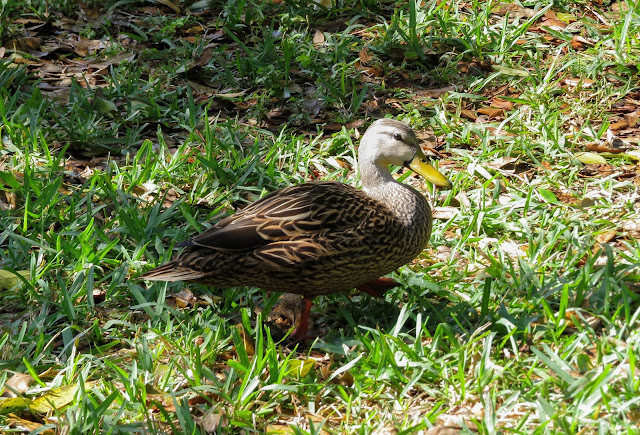 |
| Mottled Duck |
 |
| The area around the water fountain proved to be particularly rich in bird life |
The high pitched tinkling above
us gave away the presence of a small flock of Cedar Waxwings, our first
non-flyover views of the trip, while a White-eyed Vireo foraged through the
leaves.
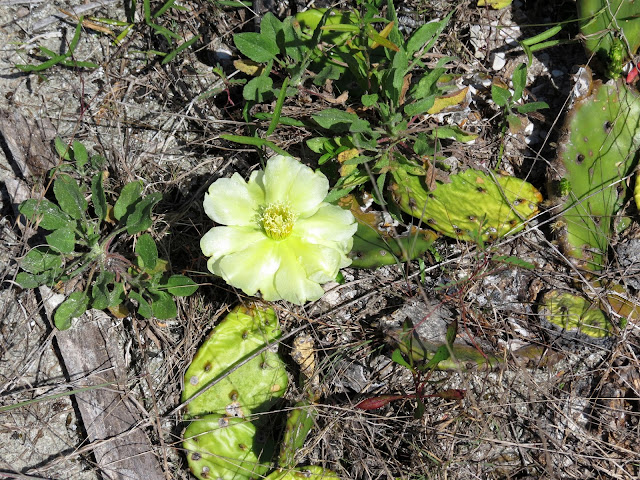 |
| Fleshy cactus plants were abundant in the fine sandy soil at Fort De Soto |
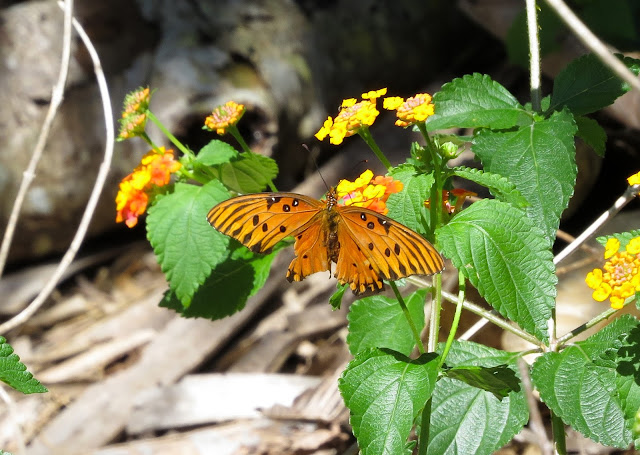 |
| Gulf Fritillary was another new species of butterfly for us at Fort De Soto |
Heading further in to the trees and encountering a local beginners bird
group, we were able to locate several Ovenbirds foraging in the leaf litter,
while a particularly showy male Black and White Warbler posed for all the
cameras.
 |
| Black and White Warbler |
With the group having found a
gorgeous Yellow-throated Warbler, we were able to enjoy prolonged views of our
third individual of the trip, the buttercup yellow throat making it easy to
locate in the foliage but still as elusive and tricky to photograph as ever,
constantly dodging behind branches and being continuously on the move.
 |
| Yellow-throated Warbler - as unphotogenic as ever! |
Alex had also found a
particularly attractive Cape May Warbler, the bright yellow and burnt umber
tones indicating this was a male, our first for the trip and our first male of
this species.
 |
| Male Cape May Warbler! |
Having previously seen a female Cape May Warbler in Central Park
last May, but only having identified it retrospectively once back in the UK
from photos, it was great to finally admire this delightful warbler in person
(as well as actually knowing what it was!) and even better to have scored with
a male.
Checking the undergrowth
carefully for any Swainson’s Warblers but with no luck, we headed over to the
beach to see what wader delights awaited us. Several American White Ibises
probed the soft ground around the picnic benches, while a group of roosting
Willets again provided point blank views.
 |
| American White Ibis showing well! |
Approaching the tideline and scanning
the nearby flock of waders revealed a number of Dunlin, Sanderling and
Turnstones while a single lone American Oystercatcher roosted, the
characteristic yellow and red eye hidden as it tucked its head peacefully under
its wing. Several more Willets fed in the crystal clear shallows, while an
unexpected Marbled Godwit was a nice surprise, wading through the pools and
providing our closest views of the trip.
There was also a wealth of
tern activity here, with both Cabot's (now split from Sandwich Tern) and Royal Terns noisily flying back and
too with fish, while a small number of Least and Common Terns darted and fished
along the tideline. A handful of Brown
Pelicans also soared majestically over the water, while the usual Great Blue
Herons and Double-crested Cormorants fished nearby. A third Wilson’s Plover
also came scuttling towards us over the white sand, an unexpected bird at this
site and a great addition to the day.
Looking towards a clear
shallow patch of water behind us also revealed our most confiding Reddish Egret
of the trip, hunting for any small fish in the peculiar way Reddish Egrets seem
to do by almost dancing over the sand, waving their long necks in a fashion
almost like snakes being charmed and looking extremely comical.
 |
| Reddish Egret |
We were able to
get fantastic views of the subtly beautiful plumage and the bright bubble-gum
pink bill, with the egret coming so close to us that I wasn’t able to fit it
all in the frame of my camera!
Leaving the peacefulness of
the shore and the many intricately patterned and beautifully coloured tropical
shells that were scattered over the sand behind, we headed back in to the trees
to see what other species we could find, hoping to strike it lucky with any
Swainson’s Warblers.
Sadly we didn’t manage to
locate any other warbler species in this part of the reserve, but a pair of
Common Ground Doves foraging in the grass and along the gravel pathway finally
offered us a chance to photograph this dainty species of dove – far less common
than we had anticipated with only a handful encountered during our time in
Florida.
 |
| Common Ground Dove living up to its name |
We were also able to get much
more satisfactory views of the Nanday Parakeets here at Fort De Soto, coming
across a group of three birds drinking out of a puddle before flying in to a
nearby tree.
 |
| Nanday Parakeet! |
With their distinctive black faces and electric green plumage,
there was no mistaking these gaudy birds, and it was great to see them out in
the field as opposed to viewing from a roadside.
Deciding to leave Fort De Soto
in order to head up north in an effort to locate Carolina Chickadees at Brooker
Creek Preserve, we were soon back on the road and heading to our next
destination.
Unfortunately, our plans
became unstuck at this point, and an incident with another car at an
intersection on route rendered our hire car undriveable. Luckily, both
ourselves and the other driver were left unscathed, and as we watched our car
get towed away we were incredibly thankful that we had avoided anything worse.
With no car and no desire to
continue birding that day, we accepted a lift back to the hotel – the delicious
Tapas restaurant and associated lamb cutlets going someway to lift our spirits
after what had been an eventful end to the afternoon.
Thankfully having taken out
full insurance cover at the hire car desk in Orlando, we were able to pick up a
replacement from Tampa airport the very next morning, and we were soon back on
the road again. Unfortunately, my extremely bruised and swollen leg as a result
of the incident prevented me from moving in any manner other than a weak hobble,
so we chose to take it easy at Sawgrass Lake Park, a known breeding site for
Swallow-tailed Kites. Whilst we saw no new birds for the trip here, Sawgrass
Lake did deliver on the kite front, with two birds soaring over the car park at
regular intervals.
 |
| The tranquil setting of Sawgrass Lake |
We were also able to locate
several Northern Parulas and Palm Warblers trilling in the tree tops, while the
usual Gray Catbirds and Blue Jays called noisily by the paths. Sitting down on
one of the benches to watch an Anhinga dry its outstretched wings in the sun,
we also noticed a nearby bush covered with butterflies, Alex managing to get some shots to aid in the identification.
Walking across the boardwalk
to the lake revealed several Alligators waiting patiently in the murky depths
for any unsuspecting prey, while the usual American Coots and Common Gallinules
bobbed around, some with chicks in tow.
 |
| Baby Common Gallinules! |
As suggested in the ebird
report, Sawgrass Lake was a promising location for raptors, with several Black
and Turkey Vultures soaring overhead while an Osprey and pair of Bald Eagles
fished on the large lake. A Gull-billed Tern was also an unusual find on the
lakeside edge, our first bird of the trip, while a single Purple Martin
fluttering over the hide was another bird of note. We also saw several reptiles at Sawgrass Lake, with various types of Cooters basking on the bank as well as a Florida Softshell Turtle giving great views as it swam under the bridge as we walked across.
 |
| Florida Red-bellied Cooters and Suwannee River Cooter - note the difference in shell size and shape |
Wanting to get back to Orlando
in good time for our final night’s stay, we enjoyed a quick lunch before
heading back on the road, taking the time to remove a number of Fir Tussock Moth caterpillars from the car before
starting our journey east.
 |
| Fir Tussock Moth caterpillars were everywhere - over the benches, the cars, you name it! |
With just the usual birds along the highway – mostly Wood Storks, Grackles, Egrets and a ringtail Northern Harrier flying over the road, we had soon made it to our final hotel in good time, enjoying a last delicious Florida meal in the nearby Lobster restaurant before settling down to a night’s sleep ready for our final day in the Sunshine State and our flight home.














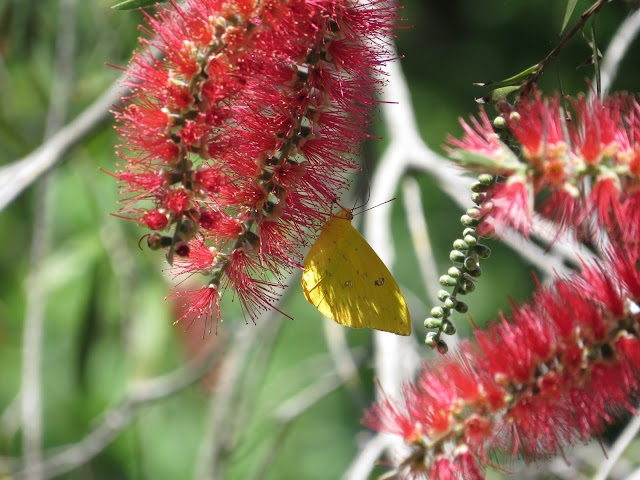








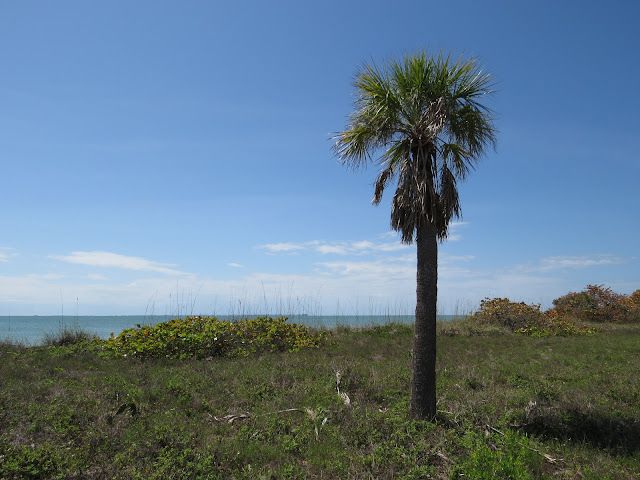


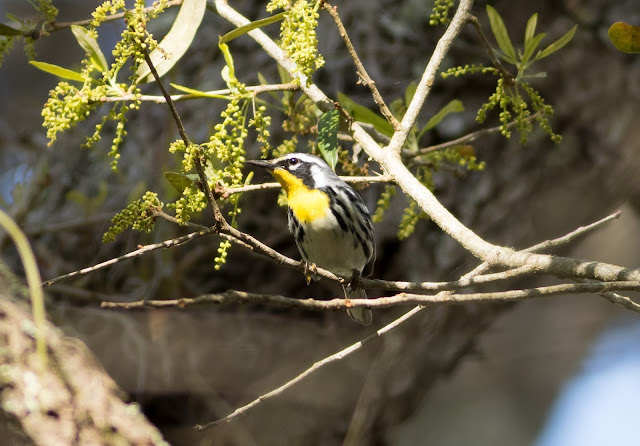
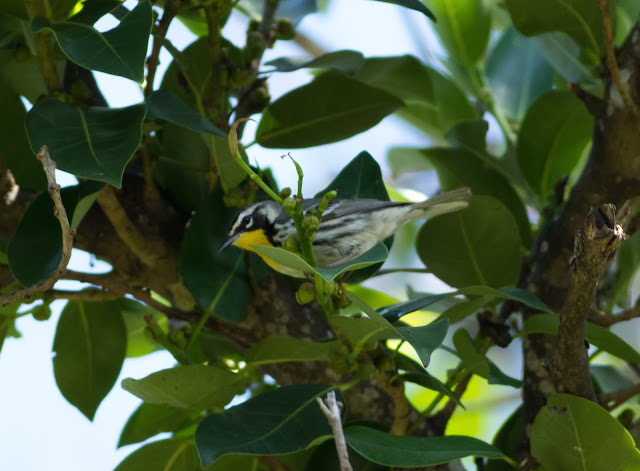










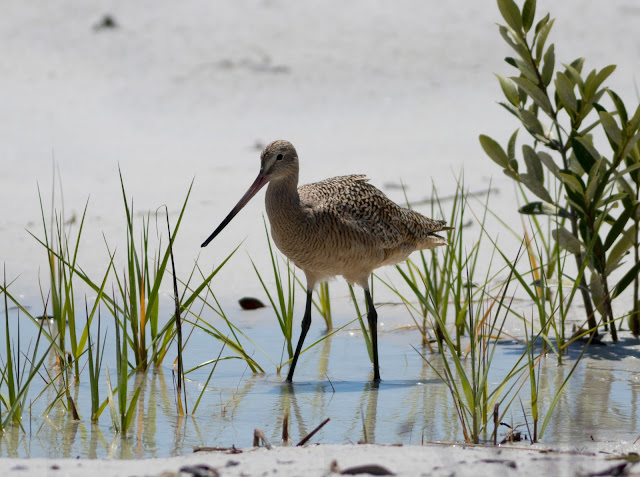














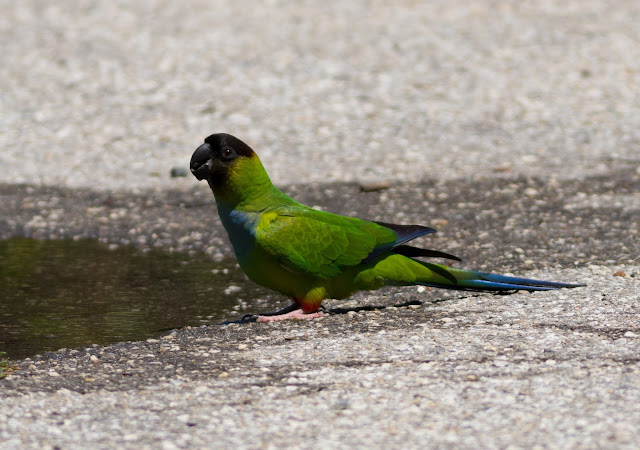




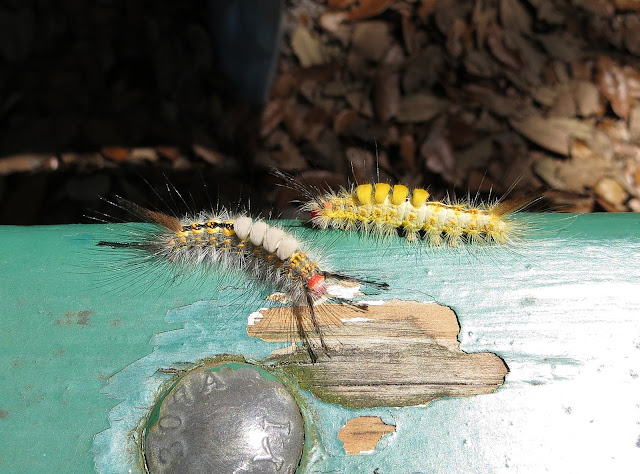
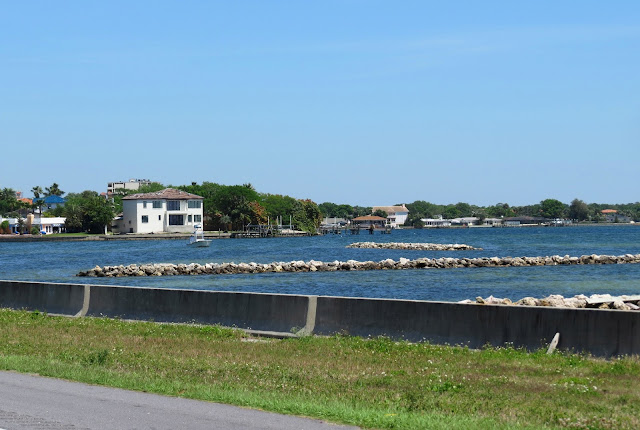

No comments:
Post a Comment